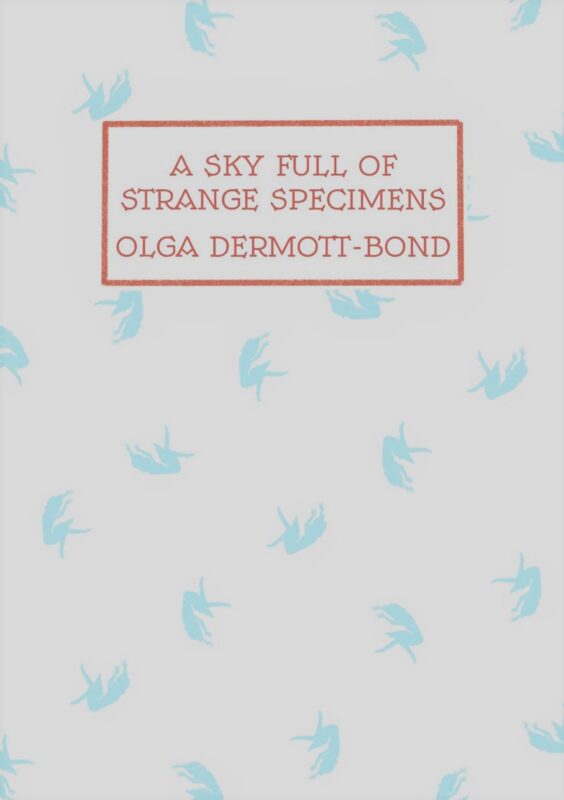REVIEW: OLGA DERMOTT-BOND’S ‘A SKY FULL OF STRANGE SPECIMENS’
By Stella Backhouse

Insecurity laps the poetry of Olga Dermott-Bond’s 2021 pamphlet A Sky Full of Strange Specimens. I use the word ‘lap’ advisedly: this is a collection where water and disaster haunt each other across the pages. A house falls into the sea; a baby is miscarried into bathwater; a driver in mental torment is “parked on the bridge over the a46, the road beneath/black water”. But as well as catastrophe that actually happened, Dermott-Bond’s poems are also stalked by anxiety about catastrophe yet to come.
Uneasy forebodings loom over poems that the scrutinise the past for shadows – missed or overlooked at the time – of sorrow to come. In Olga, we thought you’d like to see this memory from 8 years ago, a social media platform presents an archive picture which the poet feels compelled to “search for the fracture that started it/all, but it’s hidden beneath the coat she loved – she’s not/struggling yet, doesn’t know soon she’ll be buried up the neck”. Both here and in other poems such as ‘Biology Homework’ and ‘31 Green Lane’, the past is reinterpreted through the filter of knowledge obtained later, the classic poetic preoccupation with the passage of time and the impossibility of going back to change things clashing almost audibly with the cheery, clunky marketing-department exhortation to ‘make a memory’.
But even if you don’t meet trouble half-way, it’ll find you anyway. I don’t know how much of the narrative here is biographical, but there are poems, sometimes affecting, sometimes bleak, about miscarriage, post-natal anxiety, a significant other in the midst of a mental health crisis and a mother who is terminally ill. Happiness – life itself – in these poems is like islands of dry land hard-won from the waters and in constant danger of re-engulfment. It’s little wonder, perhaps, that there is a strong urge to stay indoors, in the security of the house.
Many of the poems are set inside the house, often with a clear sense of the specific room. In ‘Before Depakote’ the kitchen is “oiled blue and swaying, tilted by the smell/of his full glass, the second or third if I get home too/late”. The ultimate horror of trouble invading the safe refuge of home culminates in ‘Mrs Florence Skelton’s house falls into the sea, 1946’, when the liquid spectre of drink again hovers: “Coming back from/the kitchen, there was a great/haul of wind and the living room/swayed like a drunk man”. The compromised safety of the house is also paralleled with the fragile safety of the womb, both in ‘Miscarriage’ and in ‘mother, somehow’, in which the new mother laments that her body is “drowned/with metallic pain” and her child is “on the outside now”.
Something about this collection marks it as particularly vivid. It may be the descriptions of weather – most of it turbulent, stormy and wet, but unpredictably interspersed with brilliant flashes of midsummer sunsets and beaches, shimmering in the heat of July. It’s like a train hurtling through long dark tunnels suddenly – dazzlingly – separated by fleeting gulps of daylight. And it is a collection about survival. Mrs Skelton doesn’t die with her house when it falls into the sea: apparently she lives to tell the tale. Similarly, the last poem sees the poet choosing to move on, leaving her old house behind.
Poetry is a helper in this process. In ‘Declaration’, writing, however imperfectly it does the job, is a house-within-a-house, “a shelter with parenthesis, walls that can’t meet, their/dark space, making me stoop. I want you to find bookshelves/of confessions that I haven’t written yet”. But it is also, perhaps, a way of navigating and imposing some sort of order on the fearful waters beyond. In ‘raining elsewhere’ the poet pictures herself “stood outside/arms stretched, hair flattened like dead leaves, skin/unstitched, holding out/a cracked glass, trying to catch everything that has ever/happened to me”.
The cracked glass is, I think, poetry itself – its transparency imperfect, possibly a bit leaky, but also providing some way of containing the water, collecting it together and stabilising it and, so doing, offering the possibility of examining and taming it. Olga Dermott-Bond has a new collection coming out with Nine Arches later this year. It should make interesting reading.
A Sky Full of Strange Specimens is available to purchase online, direct from publisher Nine Pens Press, as well as other bookshops and retailers.
